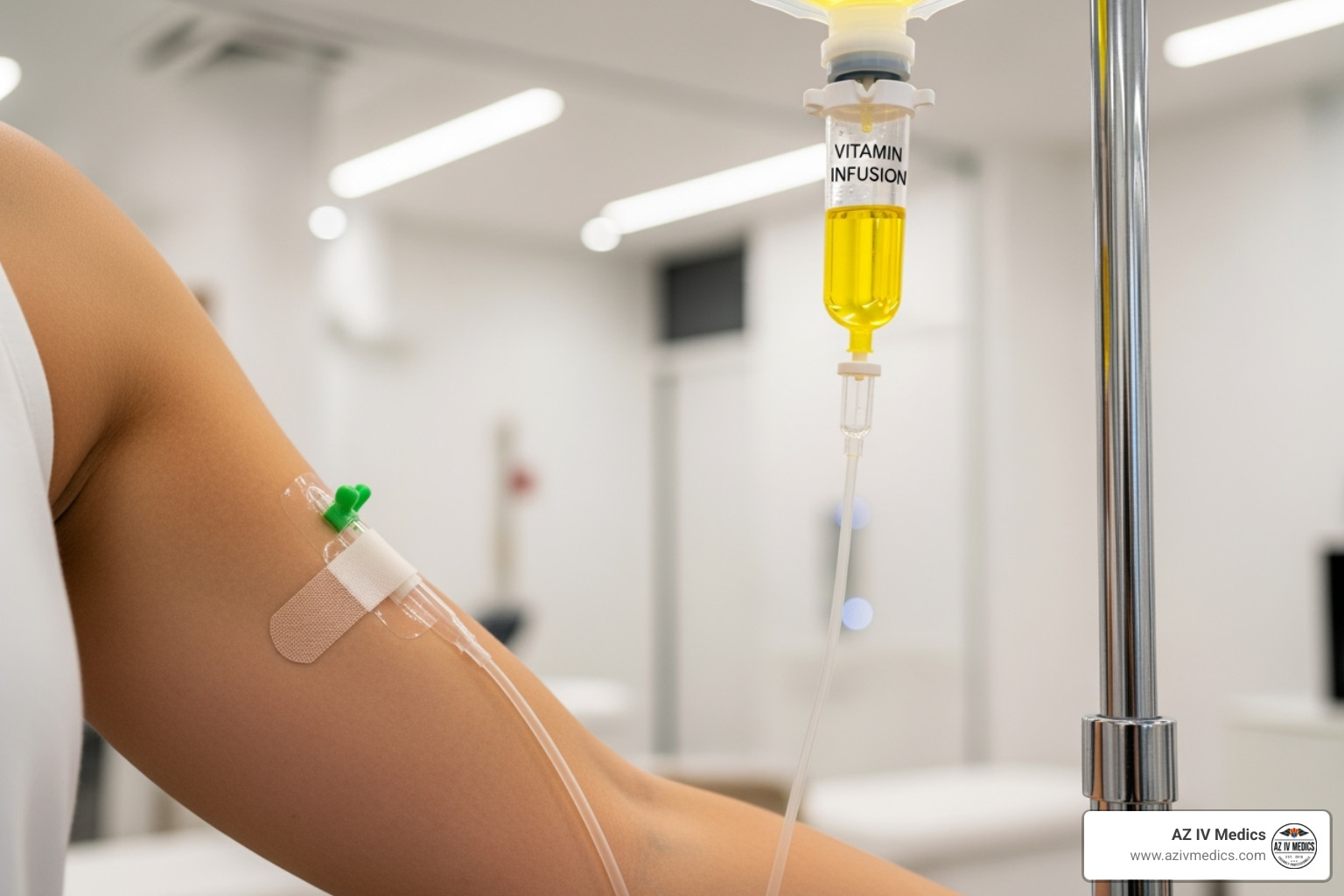How to Rehydrate After Vomiting with help of IV therapy

Medically reviewed by Micaela Strevay, FNP-C, PMHNP-BC
Table of Contents
Vomiting is a powerful and often uncontrollable bodily response, serving to expel harmful substances from your system. Whether you are battling a viral infection or a severe stomach bug, recovering from food poisoning, or dealing with a hangover, this protective mechanism comes at a significant cost: rapid and substantial fluid loss. Within just a few hours, this can lead to severe dehydration, leaving you feeling weak, dizzy, and even more miserable. Understanding the right hydration strategies is not just a comfort measure; it's the key to a fast and safe recovery. This guide will walk you through every step of that journey, from gentle home remedies to the most effective solution available today.
Understanding the Dangers of Dehydration
Dehydration is a state where your body doesn’t have enough fluid to carry out its normal functions. This condition is far more complex than simply being thirsty. It's a fundamental depletion of your body’s critical resources. When you vomit, you lose more than just water; you lose essential electrolytes like sodium, potassium, chloride, and magnesium, which are crucial for maintaining the body's intricate fluid balance.
The Immediate Impact of Fluid Loss
Every cell and organ in your body relies on proper hydration to function. When fluid levels drop, your blood volume decreases, forcing your heart to work harder to circulate what remains. This can lead to a dangerously rapid heart rate and a drop in blood pressure. The symptoms are often immediate and distressing: a parched mouth, profound fatigue, confusion, and painful muscle cramps. This cascade of events begins with a single instance of vomiting but accelerates with each subsequent episode, making a proactive response to fluid loss absolutely critical.
The Dangers of Electrolyte Imbalance
The loss of electrolytes is a silent but dangerous side effect of vomiting. These tiny minerals carry the electrical charges necessary for nerve signaling and muscle contractions. Without a healthy supply of electrolytes, your brain can struggle to communicate with your muscles, leading to tremors, dizziness, and even fainting. A severe electrolyte imbalance can hinder your kidneys' ability to function, and in prolonged cases, this can lead to serious complications such as a kidney injury. You must prioritize fluid intake to avoid these health risks and allow your body to heal.
Oral Rehydration Therapy: The First Step
For mild cases where you are able to keep liquids down, Oral rehydration therapy is the first line of defense. The goal of this approach is to slowly and methodically replenish your fluid loss without causing further upset to your compromised digestive system. This is an art of patience, as attempting to chug a large glass of water can immediately trigger another round of vomiting. The key to successful oral rehydration is to take very small, frequent sips, ensuring your body absorbs the fluid gradually.
Choosing the Right Rehydration Solution
A proper rehydration solution is far more effective than plain water. The best solutions contain a balanced mix of sugar and salts to help your body absorb fluid more efficiently. You can find these as commercial rehydration solutions at any pharmacy, such as Pedialyte or Gatorade G2. These products are scientifically designed to provide the perfect ratio of fluid and electrolytes that your body needs.
The Role of Sports Drinks and Other Electrolyte Drinks
Many people turn to sports drinks or other electrolyte drinks during an illness. While these do contain electrolytes, many are also loaded with sugar, which can actually worsen diarrhea and discomfort. It is best to choose low-sugar versions. Likewise, you should avoid all carbonated soft drinks entirely, as the fizz and excessive sugar can irritate your stomach and prolong your nausea. For those who cannot tolerate even small sips of fluid, sucking on Ice Chips is an excellent alternative. The slow, gentle intake of moisture can help to reduce a significant amount of fluid loss and get some liquid into your system without triggering a gag reflex.
The Limitations of Oral Rehydration
Despite your best efforts with oral rehydration solutions, there are times when this approach is simply not enough. The signs that your fluid intake is failing are clear and should not be ignored. If vomiting is persistent, if you feel dizzy or lightheaded when you stand up, or if you haven't urinated in several hours, it's a clear indication that your body is not absorbing the fluids you are consuming. In these moments, your fluid levels continue to drop, and you need a more direct and reliable solution. This is when the medical community advises turning to the superior power of intravenous hydration.
The Power of IV Hydration
When oral rehydration therapy is no longer effective, the use of IV fluids is the most direct and reliable option. IV therapy delivers a sterile saline solution and a customized mix of electrolytes, vitamins, and medications directly into your bloodstream. This bypasses the digestive system entirely, ensuring 100% absorption and providing immediate relief from dehydration.
The Science Behind IV Fluids
The secret to IV hydration lies in bioavailability. Unlike oral liquids, which must first be processed by your stomach and intestines, IV fluids are immediately available for your body's use. This means that within minutes of beginning treatment, your fluid levels begin to normalize, your blood volume is restored, and your cells can finally get the hydration they desperately need. This rapid delivery of fluids and nutrients is what makes IV therapy a life-changing solution for severe dehydration.
What's in a Hydration Drip?
A standard hydration drip contains more than just saline. At AZ IV Medics, we custom-tailor our IV fluids to meet your specific needs. Our drips contain essential electrolytes to restore your fluid balance and can be fortified with a variety of add-ins. You can explore our IV therapy packages to find the right solution for you:
- Anti-Nausea Medication: For severe cases of vomiting, a powerful anti-nausea medication like Zofran can be added directly to the drip, helping you stop vomiting so your body can begin to recover.
- B Vitamins: Essential B-complex vitamins are crucial for energy production. When you're sick, these vitamins can help combat fatigue and lethargy.
- Pain Relievers: We can also include anti-inflammatory medications to soothe headaches, body aches, and other symptoms.
The Essential Role of Electrolytes in Rehydration
Electrolytes are crucial when it comes to rehydration after vomiting. The body's fluids are composed of water and dissolved salts known as electrolytes, including sodium, potassium, calcium, and magnesium. When you vomit, you lose not only fluids but valuable electrolytes that help regulate nerve and muscle functions, balance blood acidity and pressure, and rebuild damaged tissues.
Our IV drip packages at AZ IV Medics are specially formulated to replenish these vital electrolytes quickly and effectively. By providing a direct infusion to the bloodstream, our IV solutions offer fast relief, bypassing the digestive system, which can be sensitive following a bout of vomiting.
Custom IV Options to Suit Your Needs
Understanding that each person's hydration needs can differ, we offer a range of customizable IV therapy options that can be tailored to your specific requirements. Here’s a look at some of the additional components you can opt for:
- Vitamins and Antioxidants: Speeds up recovery by boosting the immune system and reducing oxidative stress in the body.
- Medications: Anti-nausea medication can be added to help calm your stomach, reducing the risk of further vomiting.
Customizable IV Therapy Components
- Vitamin C: Known for its immune-boosting properties, vitamin C can aid in recovery by supporting your body's natural defense mechanisms. This can be particularly beneficial if your vomiting is related to an illness.
- Glutathione: Often referred to as the "master antioxidant," glutathione helps detoxify the body and protect cells from oxidative stress. Adding glutathione to your IV therapy can aid in faster recovery by optimizing cellular health.
- Amino Acids: These building blocks of proteins can facilitate muscle repair and immune system function. If you're feeling weak or fatigued after vomiting, amino acids can help restore energy and promote recovery.
- Zinc: Playing a vital role in immune function, zinc can help speed up recovery by supporting the immune system and reducing the duration of illness symptoms. It's a key player in the healing process.
- Hydration Boost: If dehydration is severe, a double dose of hydration fluids can be administered to rapidly replenish fluid levels, helping you bounce back faster.
The Convenience
In the past, receiving IV hydration meant a stressful trip to an emergency room or urgent care clinic, where you would face long waits and exposure to other illnesses. Our mobile IV service eliminates this ordeal. A certified medical professional will come to your home, office, or hotel, providing a professional and comfortable experience. We proudly serve our community in Scottsdale, Arizona and many other locations. To see if we serve your area, please visit our service area page. This is the ultimate form of hydration strategies when you are feeling your worst.
Conclusion
Vomiting can leave you feeling completely drained, but with the right hydration strategies, you can get back on your feet quickly. While a careful approach to oral rehydration is the first step, knowing when to turn to the superior, fast-acting power of IV fluids from AZ IV Medics, you can restore your body's balance and get back on your feet quickly.





